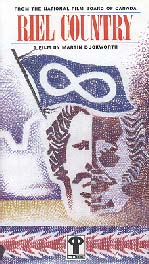|
________________
CM . . . .
Volume VII Number 17 . . . . April 27, 2001
Winnipeg, Manitoba, is a city at the confluence of the Red and Assiniboine
rivers. Geography and history have made it a meeting place: ethnic
backgrounds are many, with 4.7% of Winnipeg's population being French, 4%
being Metis, and nearly 36.3% identifying themselves as "multi-ethnic."
Welcome to "Riel Country," a city and province in which both the French
and Metis are minorities, yet have strong cultural identities. Railroad
tracks divide and unite the city: on one side of the Red River, in
Saint-Boniface, live the majority of the French. At Ecole Precieux-Sang, a
French-language high school, an elderly Metis woman invited to speak to
students on the occasion of the 125th anniversary of the founding of the
Province of Manitoba, reminds them that, like it or not, many of them have
Native blood in their families. Across the river, at R.B. Russell High
School in Winnipeg's multi-ethnic North End, nearly 35% of the students
are Native and 35% are Metis. A group of students from Ecole Precieux-Sang
are invited to R. B. (as it is known) and, working with the drama club,
they workshop a play entitled "The First Metis." At first, the two groups
seem to come from different worlds. Ecole Precieux-Sang students are
well-dressed and comfortable and come from stable, middle-class families.
At R. B. Russell, many students live on their own, many have been kicked
out of other schools, and many are parents themselves. But, over time
spent together at events like Festival du Voyageur (an annual mid-winter
festival of francophone culture held in Saint-Boniface) and in drama
class, they learn what they do share: tensions with their families,
difficulties with assumptions others make about their ethnic or cultural
background. And in presenting the play about the first Metis, they draw on
those similarities and differences.
Riel Country is a thought-provoking film. Louis Riel, himself a Metis, the founder of the
province of Manitoba, dreamt of a province where members of many ethnic communities could
maintain their culture, their language - in short, their ethnic identity. Was he too idealistic? Could
he have foreseen the polarization of French-English language conflict, the plight of the Native and
Metis population? Those questions remain unanswered. Certainly, hope lies with the young
people who seem eager to escape the prejudices of the past. Riel Country offers its viewers a
unique perspective on the history and culture of the first western Canadian province. Useful for
Canadian history, Canadian Studies, and Native Studies.
Recommended.
Joanne Peters is a teacher-librarian at Kelvin High School in Winnipeg, MB.
To comment on this title or this review, send mail to cm@umanitoba.ca.
Copyright © the Manitoba Library Association.
Reproduction for personal use is permitted only if this copyright notice
is maintained. Any other reproduction is prohibited without
permission.
Published by
TABLE OF CONTENTS FOR THIS ISSUE - April 27, 2001.
AUTHORS |
TITLES |
MEDIA REVIEWS |
PROFILES |
BACK ISSUES |
SEARCH |
ORDER |
CMARCHIVE |
HOME
|
